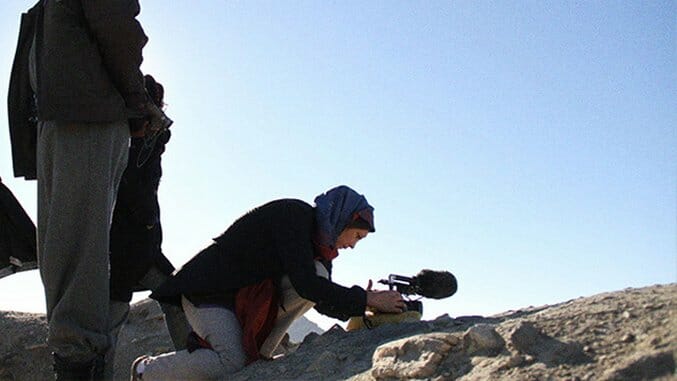Cameraperson

Cameraperson. Kirsten Johnson’s title for her latest documentary feature could not be any more nondescript. And yet, the anonymity of that title points to perhaps the most remarkable aspect about this film: its maker’s sheer selflessness, her devotion to her craft and her subjects, her seemingly complete lack of ego. The film is pieced together from outtakes from the long-time documentary filmmaker/cinematographer’s extensive body of work, but beyond occasionally hearing her voice behind the camera (and one shot towards the end in which we finally see her face as she points the camera toward herself), Johnson forgoes the safety net of voiceover narration to tie all this footage together. The footage speaks for itself, and for her.
Which is not to say that the film is just a compilation of clips strung together willy-nilly. Johnson breathes an animating intelligence into Cameraperson’s construction, employing a method that suggests a mind processing one’s life experiences, contemplating the sum total of her work, veering off into tangents whenever she happens upon a piece of footage that triggers broader reflections. Though most of the film is built out of snippets of footage introduced by a title card indicating where it was shot, she’ll occasionally, suddenly lead into montages bound together by theme. A tour of sites in Fo?a that were focal points of ethnic-cleansing activity during the Bosnian War segues into shots of locations in other countries in which similar tragedies happened: a pickup truck in Austin that was used to drag African-American James Byrd Jr. to death; Wounded Knee; the World Trade Center before 9/11. Later, a discovery of a letter Johnson herself wrote to God as a child in 1975 inspires a series of segments showing people in other cultures expressing their religious faiths. And though the film spans many countries, Johnson keeps coming back to the same places and people, fashioning recurring motifs out of a refugee family in Bosnia, a devoted nurse in Nigeria, and even her own mother and twins. In a life in which she has borne witness to so much, there are simply certain people and images that she can’t help but keep returning to in her mind.
To be sure, the impression all of these clips in toto is of a life fully lived, of an artist who has seen much in her life and wants to share all she has learned with the rest of the world. But Cameraperson adds up to so much more than just a personal remembrance. Johnson has spent much of her career dealing with subjects related to political activism and human rights—she was, after all, the cinematographer of Michael Moore’s Fahrenheit 9/11 and Laura Poitras’s The Oath and Citizenfour, among many other films—and peeking through the essayistic qualities of her film is an implicit political stance: a humane focus on individual rights and a healthy skepticism toward people in power. Cameraperson is, in some ways, an activist documentary in the guise of a memoir.